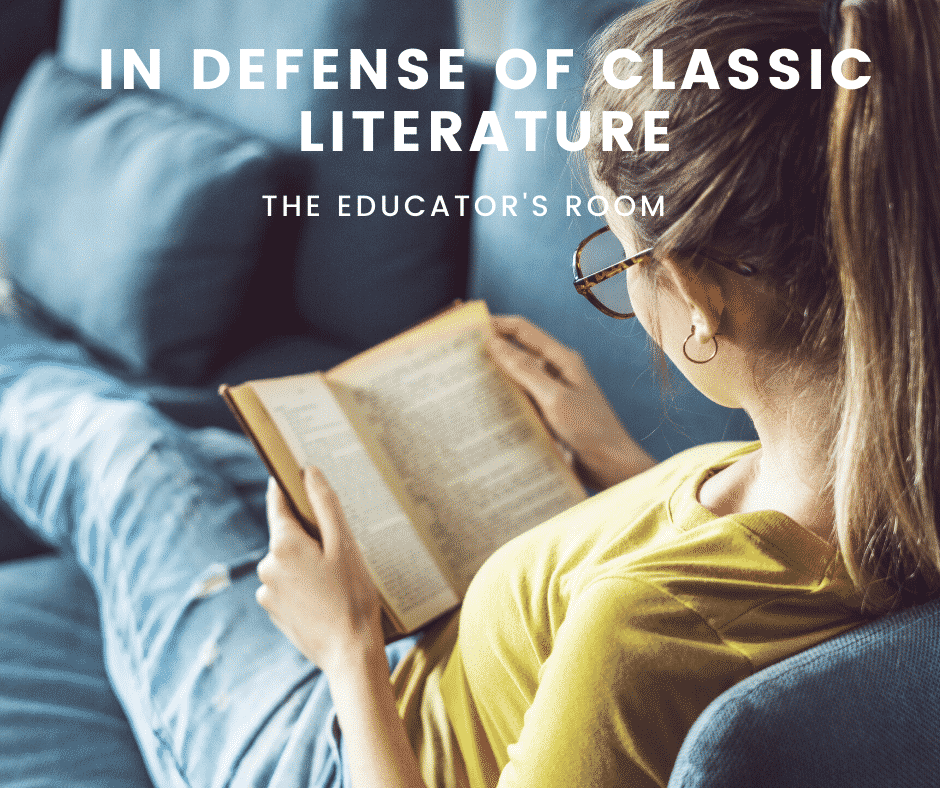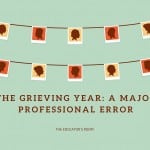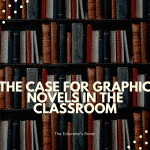Every so often, Twitter is abuzz with literary “hot takes.” Some are anti-Shakespeare. Others want only contemporary literature in schools. Most of the time, they are about how awful some classic literature is. They talk about the classics, and how overrated they are. The comments range from agreement to shock. The
Classics and Language
One of the big complaints against classic literature is that they can be difficult to understand. A high school blogger outlines this well in one of her posts. She points out that because of the language and writing style, some students give up. The article points out that some try and get halfway through the novel, while others don’t make it that far. The English language has changed quite a bit over time. This can be a challenge for students. Does that mean that there is no place for those texts?
The idea that a text should be removed because it is challenging is problematic, at best. It is a perfect opportunity to practice critical thinking. Tackling challenging texts also helps students learn about context clues. There is not better way to learn the definitions of new words than by looking at the context. As a teacher, that is part of what I want my students to learn, that they can figure out any strange word and grow their vocabulary. Plus, by becoming stronger readers, they become stronger writers. It is a joy to watch students struggle with Shakespeare or Jack London, and see them come out stronger readers on the other side.
Questions of Relatability
What do my students today have in common with a farmer struggling on the Nebraska prairie, a solicitor trying to work with a mysterious count, or the marriage struggles of five sisters? What in those stories can they actually relate to? Students ask this question often, but teachers can find the answer. Every time this topic comes up, I find a flood of articles outlining this very thing, because, of course, there are always things to learn. O Pioneers!, Dracula, and Pride and Prejudice can all teach my students something.
As I was researching this topic, I found a wonderful definition of classic literature, “a classic is any book that is infused with universal themes and speaks loudly to all humanity through superior prose.” No matter how antiquated the language seems to us today, there is something about those texts that we can all relate to. Lord of the Flies speaks to the possibility of evil in all of us, Frankenstein to the temptation to trust too much in our knowledge.
Can these themes be found in other, more modern texts? Yes, but why should we rob our students of the knowledge that they are in a long line of humans who have wrestled with the same topics? The same article linked above suggests pairing classic literature with similar modern stories. This further helps tie those struggles to a more modern audience.
Reading the classics also opens the eyes of readers to the lives of those who lived during the time the book was set or written. Some things never change, and reading classic literature is a great way to remember that. There are things that connect all of us through history. Those struggles are outlined in classic literature. This can also help students learn to be empathetic. No one can read Toni Morrison’s Beloved without choking up a little. All educators need to do is help our students make that leap.
Final Thoughts on Classics
Sometimes, it is easier to just teach the classics. That’s what we have always done. Why change now? When teaching, we all need to remember, teach the literature that brings you joy. Kids are smart. If I hate the book I am using to teach them, they’ll know it. But they will go along with me if the book being used is one that makes me excited. Whether a book is a contemporary or a classic, there is something to be learned from all books. As we are looking to broaden our horizons, however, let’s not toss out the baby with the bathwater. There is still plenty to learn from the classics.







I for one detest all classic literature. It has no practical value unless you aspire to play trivia games or Jeopardy. I am sorry that I wasted two years of my life studying classic nonsense. If I could sue for mental anguish, I would. I am not saying the nonsense (classics) should be banned but would propose them becoming electives. I learned to hate reading in high school. That was almost 50 years ago. Please please stop shoving this garbage down our throats.
I said it once and I’ll say it again, I cannot stand fiction. The last fictional book I read was in 1976 and it was required for graduation. On a positive note I forgot the author and name of the book. I just wish I could get over the time I wasted studying this crap.
I actually quite enjoy reading classic literature. It has contributed a lot to enhancing my reading skills and understanding words I have never heard of but knowing its definition by spotting clues in the context. I also enjoy how I relate less to the contents of the book and finding the hidden message that appears to be quite vague until the end of the book usually, or analyzing it later on after reading the book. It helped with my critical thinking skills and I could deduct things better. However, I do know that not all students enjoy such difficulty and finding joy in them. It may also prove to be boring to them. However, they are certainly NOT trash, or garbage. What I do think that can help alleviate this is that classic literature materials can be replaced with a certain range of books that teachers have chosen before. Personally, I enjoy reading classic literature. It provides useful insights and have proven to be beneficial to me. It has also taught me how to appreciate books better.